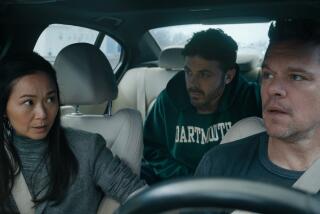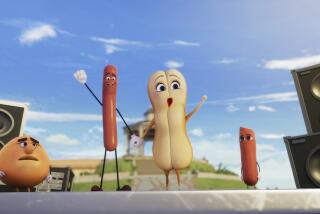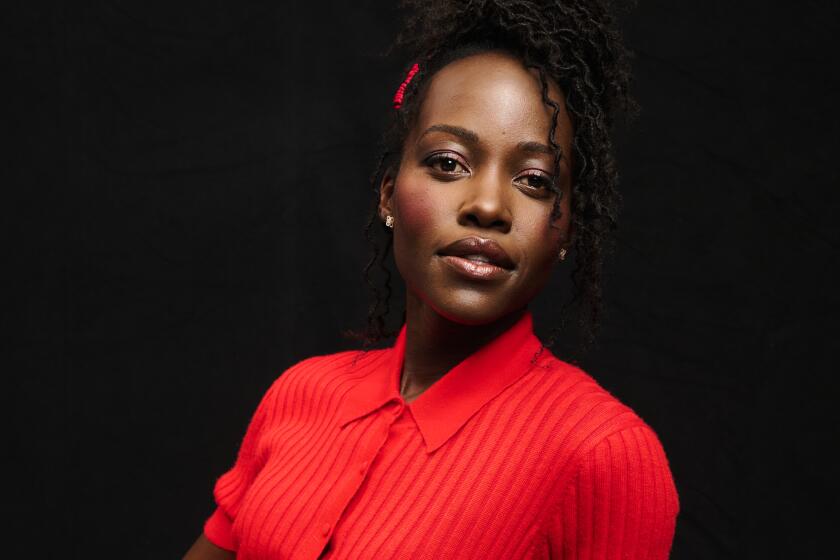Critic’s Notebook: Pining for sophisticated comedy in a world of raunch
It would seem beyond argument that Americans are more sophisticated today than they were in the 1930s and ‘40s. We travel, communicate and do business across the globe, have access to more information and more types of sensation than ever before — the world is at our feet both literally and figuratively.
So why are our screen comedies by and large so much cruder and raunchier, so much less elegant and cosmopolitan, than they were back in the day?
------------
FOR THE RECORD:
“Dumb and Dumber To”: A photo caption in the Dec. 7 Calendar section accompanying an article about raunchy movies misidentified actor Jeff Daniels of “Dumb and Dumber To” as Jeff Bridges. —
------------
There are rogue exceptions, of course, like classic period Woody Allen and individualistic auteurs like Alexander Payne and Nicole Holofcener. But as a general rule today’s moviegoers look in vain for modern equivalents of such films as Preston Sturges’ “The Lady Eve,” Ernst Lubitsch’s “The Shop Around the Corner” or Howard Hawks’ “Bringing Up Baby,” only to be faced with a choice of “Neighbors,” “Horrible Bosses 2” and “Dumb and Dumber To”
The argument is not that today’s films aren’t funny, because what would be the point? Nothing is more individual and unassailable than a sense of humor, and in a world where a recent $38-million opening for something called “Breakup Buddies” proved, as Variety wrote, “that raunchy comedies can play in China,” these kinds of films have never had trouble amusing audiences everywhere.
More than that, with the New York Times reporting that habitually reserved French critics have taken to calling these pictures evidence of “le nouvel âge d’or de la comédie américaine,” it’s clear that reviewers as well as audiences have embraced this sensibility. As BoxOffice magazine editorialized recently, “Never underestimated the power of R-rated comedies.”
So the question is not only why raunch is king but also why it has taken over so completely. How did it happen that a country that offers mind-numbing choice in everything from cars to hair conditioners offers its citizens only one kind of comedy?
It’s probably obvious by now that these kinds of films are not personal favorites. But that’s not because I don’t like to enjoy myself at the movies; in fact, my laugh is so distinctive that friends know I’m in the theater with them by hearing it loud and clear.
To figure out what I was missing, I watched two of these films, 2009’s landmark “The Hangover,” a movie so popular that it inspired two sequels, and “Top Five” starring Chris Rock, due to be released Dec. 12 and rapturously received at its Toronto Film Festival premiere a few months ago.
Both films are rated R by the MPAA and have an impressive list of reasons to back up the rating: With “The Hangover,” it’s “pervasive language, sexual content, including nudity, and some drug material,” while “Top Five” is busted for “strong sexual content, nudity, crude humor and language throughout and some drug use.” But what else, if anything, would they share?
It turns out that both films share clever plotting (by Jon Lucas and Scott Moore in the former, by star and director Rock in the latter). “The Hangover’s” tale of bachelor party guys forgetting what happened during a raucous night in Vegas is an intriguing comedic twist on such classic film noir amnesia tales as 1942’s “Street of Chance” or Alfred Hitchcock’s “Spellbound.” As for “Top Five,” its story of a former stand-up turned movie star having a midlife crisis has the sharp satiric edge that is Rock’s trademark.
So the raunch is not present because these films need it to survive; it’s there because filmmakers and their audiences want it. But why?
To look for an answer, I started by remembering the enduring popularity of pie-in-the-face slapstick and eternal fan favorites like the Three Stooges. Unsophisticated humor is not some kind of modern aberration but a taste that has always been part of the American experience.
It’s also important to understand that the pre-World War II Golden Age of Hollywood whose films I so admire was also, courtesy of the ever-vigilant Production Code, a golden age of arguably repressive movie censorship, of no swearing, no nudity and no married couples sleeping in double beds.
In fact, as Thomas Doherty points out in his biography of Joseph Breen, the Code’s enforcer and the movie business’ top censor, that Breen and his ilk were responsible for “the moral universe of classical Hollywood cinema — the world of reticence, constraint, discretion, untruths and unspokens.”
Though a series of little-remembered 1950s movies like Otto Preminger’s “The Moon Is Blue” and “The Man With the Golden Arm” were gradually breaking down the Production Code, in terms of mass culture, comedians like Lenny Bruce and Richard Pryor were key actors in forcing a change.
Through stand-up routines that were both profane and taboo-shattering — Bruce’s reference to a prison gay bar in his “Father Flotsky’s Triumph” routine was so forbidden that it was lopped off the LP — these performers told truths about society and paid a personal and professional price for it. When writer-director-producer Judd Apatow (“The 40-Year-Old Virgin,” “Bridesmaids”) characterizes his comedy as “brutally honest,” he is in a sense linking himself to that tradition.
But once audiences got a taste for transgressive humor, it became an end in and of itself. The lure of the kind of stuff our parents told us we shouldn’t be seeing turned out to have a power strong enough to be called addictive, a power capable, in this risk-aversive age, of driving everything subtler off the screen.
Showing us a nominal adult mimicking an infant masturbating (“The Hangover”) or seeing the damage that can be done to an unsuspecting male with a tampon soaked in hot sauce (“Top Five”), to pick two examples out of many, doesn’t tell us any truths about society or the human condition. These sights simply offer the frisson of the forbidden, and the combination of the jolt of “I can’t believe my eyes” with the comfort of a familiarly sentimental love-conquers-all storyline (another thing both films have in common) has become an unstoppable sure thing.
In an anything-goes era where old-school sophistication is often derided as elitist, where studio executives fear being “too smart for the room” and where reality-TV freak shows suitable for gawking express the spirit of the age, the chances of this trend ending any time soon are slim to none and, as a friend likes to say, “Slim just went home.”
Or maybe not. Maybe, just maybe, somewhere in America, a young prospective filmmaker, bored to tears by torrents of profanity and rivers of raunch, will stumble across “The Lady Eve” and say, “This is different, this is fun.” Here’s looking at you, kid. The future of sophisticated comedy is in your hands.
More to Read
Only good movies
Get the Indie Focus newsletter, Mark Olsen's weekly guide to the world of cinema.
You may occasionally receive promotional content from the Los Angeles Times.









